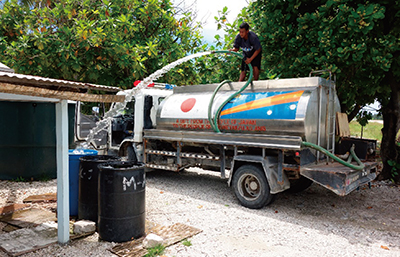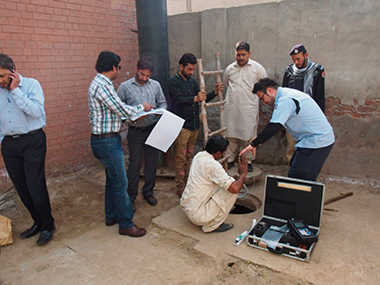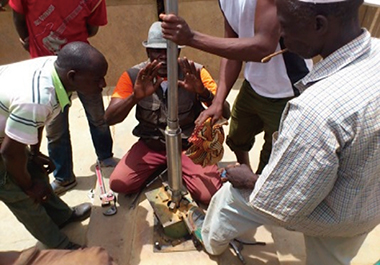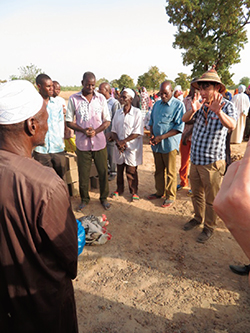(2) Water and Sanitation
Water and sanitation are vital issues linked to human life. In 2017, approximately 844 million people worldwide had no access to safe water, such as piped water and wells, while approximately 2.3 billion people—about half of the population of developing countries—had no access to improved sanitation facilities, such as toilets and sewage systems. Approximately 360,000 children under the age of five have lost their lives due to diarrhea caused by the lack of safe water and sanitation facilities. Moreover, being unable to access safe water impedes economic growth. For example, in developing countries where piped water is not widely available, in many cases women and children bear the role of fetching water. Sometimes, spending many hours for this work deprives children of opportunities for education, and women of engaging in society. Furthermore, an unstable supply of water has a negative impact on healthcare and agriculture.
From this viewpoint, the Goal 6 of the SDGs sets forth the target “Ensure availability and sustainable management of water and sanitation for all.”
■ Japan’s Efforts
Japan’s support has the top cumulative track record in the world in the fields of water and sanitation since the 1990s. Japan draws on its extensive experience, knowledge, and technology in these fields to provide continuous support for promoting the provision of safe water in developing countries, through the means of technical cooperation, including the dispatch of experts and accepting trainees from developing countries, as well as ODA loan and grant aid. Japan also provides support through international organizations such as UNICEF. Specifically, it provides support in both the soft (non-physical) and hard (physical) aspects, including the following: (i) promotion of integrated water resources management, (ii) provision of safe drinking water and basic sanitation through the improvement of sanitation facilities, (iii) support to enable stable water use (e.g. water for agricultural use) for increasing food production and other purposes, (iv) water pollution prevention such as establishing effluent regulations, etc., and ecosystem conservation such as conservation of vegetation and tree planting, and (v) mitigation of damage due to water-related disasters, such as establishment of an early warning system and strengthening the disaster response capacities of communities.

A local government official replenishing the water drums of local households with water for everyday use, at Enewetak district located in the northwest of the Marshall Islands, using a water truck provided through Japan’s Grant Assistance for Grass-Roots Human Security Project. (Photo: Mr. Hideyuki Yamazaki, Grass-Roots Project Coordinator)
In the Asia and Oceania regions, Japan is currently implementing projects for the development and expansion of piped water in Myanmar, Cambodia, and Viet Nam (project completed in Palau). In Cambodia, where improvement of the water supply ratio in rural areas is needed, Japan signed the Exchange of Notes of grant aid for the “Project for Expansion of Water Supply System in Kampong Thom” in March 2017. In India, where the population is increasing and economic development is progressing, Japan signed an Exchange of Notes of ODA loan for the “Project for Construction of Chennai Seawater Desalination Plant ( Ⅰ )” in March 2018, which develops a seawater desalination plant to cope with the severe shortage of water.
Moreover, in Africa, Japan is implementing projects aimed at improving access to safe water and the water supply rate. For example, in Sudan, Japan is engaged in cooperation for a new establishment and development of water purification facilities in Kosti City to, improve the water supply environment.
In addition, Japan supports the water and hygiene environment improvement projects by Japanese NGOs through the Grant Assistance for Japanese NGO Projects. For example, Asian People’s Exchange (APEX), one of the Japanese NGOs is carrying out a project for the promotion of widely spreading a community wastewater treatment system, which can produce quality treated water while enabling easy operation and management at low costs, over a three-year period from February 2017. In FY2017, 12 such systems were installed on the Java island, and the system has become highly recommended by Indonesia’s Ministry of Public Works and Housing.
In parallel with these efforts, cooperation using Grant Assistance for Grass-Roots Human Security Projects and others, and efforts for the improvement of the water environment in developing countries in cooperation with domestic and local private sector organizations are also being carried out in regions around the world.
The Ministry of Environment (MOE) is also carrying out initiatives. For example, in order to eliminate the lack of relevant information and knowledge with regard to the problem of serious water contamination in many Asian countries, MOE implemented the Water Environment Partnership in Asia (WEPA). With the cooperation of the 13 participating countries from Asia, WEPA aims to enhance water environment governance in Asia through building human networks, gathering and sharing information, and capacity building.
●Pakistan
The Project for Water Supply, Sewerage and Drainage Master Plan of Faisalabad
Technical Cooperation Project (July 2016 – June 2019)
In Faisalabad, Pakistan’s third-largest city, it is an urgent matter to realize the stable and hygienic water supply as well as develop waterworks facilities. Furthermore, having issues such as low water bill collection rates, and a lack of funding required for suitable investment in facilities and their maintenance and management, the city’s water and sewerage authority, Water and Sanitation Agency Faisalabad (WASA-F) is facing major challenges in its business situation.

Measuring the amount of water flow in the pilot district of Salfraz Town (Photo: Mr. Yasushi Matsuoka, Yokohama Water Co., Ltd.)
In order to improve such problems in the city’s water and sewerage services, Japan is implementing the “Project for Water Supply, Sewerage and Drainage Master Plan of Faisalabad.” In this project, efforts are being undertaken aimed at establishing a sustainable water supply system through such measures as installation of meters in pilot districts and introduction of a new charge collection system, based on the long-term plan for the water and sewerage business and management system over the 20-year period up to 2038. The project succeeded in increasing the number of water supply contracts in the pilot districts by approximately 20%. Also, with the cooperation of Japanese municipalities such as Yokohama City, the duration of water supply was increased from 6 to 12 hours, while major improvements were also made in the aspect of hygiene, as the quality of supplied water was improved. Going forward, investment increase in facilities, and further improvement in the maintenance and management of water and sewerage services and the operation of WASA-F is intended, based on the long-term plan.
●Burkina Faso
Project for Enhancement of Water Supply Facilities Management and Hygiene and Sanitation in Rural Areas Phase 2
Technical Cooperation Project (September 2015 – March 2020)
Burkina Faso is exposed to a severe natural environment, and improving a living environment, and access to water and sanitation facilities is regarded as an urgent issue of importance. Japan has made use of various schemes, such as building water supply facilities through grant aid and dispatching experts through grant aid, to provide continuous support over many years, in the water resources sector of the country, and this is one such project.
Since 2011, Japan has constructed 300 deep well water supply facilities with human-powered pumps in the Plateau-Central Region and South-Central Region of Burkina Faso, and has guided the maintenance and management of the facilities, while providing technical guidance for training and well repair. At present, Japan continuously provides support to disseminate maintenance and management systems for water supply facilities nation-wide.
Mr. Takeshi Ono, an expert dispatched to Burkina Faso, has continued to support the country for over 18 years, and has participated in water supply projects in six other African countries. In this project, he has worked together with local officials responsible from the Ministry of Water, Hydraulic Planning and Sanitation to organize a water user management union and train union personnel, as well as provide technical guidance relating to the construction of a water charge collection system and well repair. In addition to activities on the ground, he provides support for policy planning to Burkina Faso’s water and sanitation sector, such as the formulation of national strategies for public water supply service management, to improve the country’s water supply facility maintenance and management system, together with local stakeholders. These activities by Mr. Ono have received high recognition both within and outside Burkina Faso, as “highly-visible Japanese assistance.”

Pump repair and improvement training, for pump repair workers in Ganzourgou, Central Plateau State (Photo: JICA)

Mr. Ono receiving a gift expressing thanks from villagers (a handcrafted hat) (Photo: Embassy of Japan in Burkina Faso)
